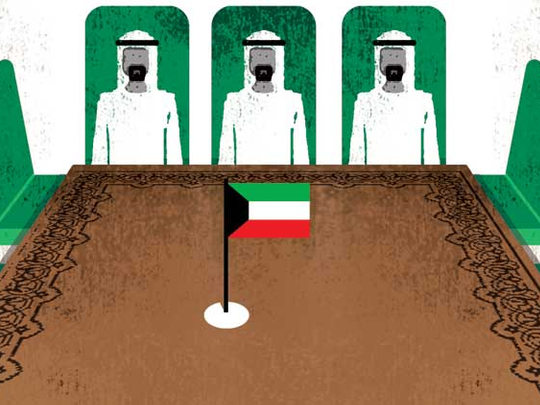
Last week, the 33rd cabinet of Kuwait was sworn in, 50 years after independence. It was the fourth Cabinet for the current prime minister, and the second for the present parliament. Seven ministers of the outgoing cabinet lost their jobs, between them two women who led the development ministry and the ministry of social affairs. One woman has been appointed for the two posts, with six men, to replace similar number who left, and the rest of the 12 excluding the head of government, were either shuffled, or kept their jobs.
Immediately the new cabinet faced a hostile reception from the social media, now available to any literate Kuwait individual. Kuwaitis love to share their views, especially if they are critical, and some times even hostile.
The criticism this time took a different angle, over ministers who served before and were brought back into the cabinet. The big question in the press and social media was: If those ministers were relieved from their posts before, presumably they had not achieved results, so why have they been brought again, and conversely if they were so good, why had they been removed earlier?
The second criticism was why when forming the cabinet were professionals ignored, especially as they are highly needed at this stage of development, and instead why did the government rely on the old system — a mix of tribal, sectarian, and political favourites?
The criticism has not only come from columnists, and activists using social media networks, but also from Members of Parliament, who feel that this coalition government will not deliver what is urgently needed.
Although as an observer I did not experience this kind of criticism before on any newly-formed government in Kuwait, this time, helped of course by the new social media, such as Twitter, Facebook and Instagram, I do think that most of the criticisms overlooked the real critical issues facing Kuwait.
Two major steps need to be taken to reform Kuwait’s ill political scene. First the constitution has to be amended and secondly formation of political parties must be allowed, based on modern regulations. The first it is obviously needed, as no written constitution in the world went that long (more than 50 years) without amendments or change. One young Kuwaiti recently told me, in an apparently funny tone, “We have not been consulted on this constitution. You the old generation have written it for your time, and we have our own time, with all modernisation and transformation that has taken place. We don’t feel it is suitable for this time and age, so we need our own constitution!”
These calls are widespread among the new generation of Kuwaiti men and women alike, and the more the wishes and aspirations of the new generation are ignored, the more their frustrations and apathy will grow. In fact Kuwait is experiencing a new phenomena in its modern history, and that is the migration of its youth.
All written constitutions in the world have been revised and they have been amended to reflect the needs of various sectors of society.
Political pluralism
The second issue which needs urgent review is permitting the formation of political parties. Political pluralism (political parties) is essential. Kuwait’s constitution stops short of allowing this important tool of democracy, so people have to depend on what they know of (pluralism) based on tribes, sects, and other social groupings. This produces social tensions and corruption, and leads to decay in public administration, as most ministers tend to fill their ministries with relatives and through patronage regardless of their ability and qualifications. Public administration thus has failed to face the challenge of the 21st century which demands modernisation.
If these two major obstacles are not looked at and resolved, whatever cosmetic steps that have been taken will soon fall apart, and the community will face major crises again. It is inadvisable for a writer to predict what will happen in the future, but one can see that this cabinet will not be accepted by the parliament and within a few months we will be again trying to rectify the problems of our political system — that too in the same traditional way
What Kuwait is facing in its political system, is structural, not incidental or temporary. Furthermore, most of the neighbouring countries are reviewing their constitutions, from Egypt to Yemen, and from Tunis to Turkey. Kuwait alone is hesitant to review a document written more than half a century ago. But the demands are growing even from people and groups who until recently thought that amending this document was taboo!
Mohammad Alrumaihi is a professor of Political Sociology at Kuwait University.








